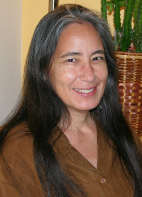Professor Natsu Taylor Saito recognized for outstanding scholarship
May 19, 2008
Georgia State University Law Professor Natsu Taylor Saito has been named the recipient of the College of Law's fourth annual Patricia T. Morgan Award for Outstanding Faculty Scholarship.
Established to recognize faculty excellence in scholarly research, the award was named in memory of one of the faculty's most prolific scholars, the late Patricia Morgan.
Morgan joined the College of Law's faculty in 1988, and was honored as Professor of the Year in 1993 and 2002. Her textbooks, Tax Procedure & Tax Fraud in a Nutshell and Cases and Materials on Tax Procedure and Tax Fraud, are used at law schools throughout the country.
Faculty award recipients receive a $12,500 summer research grant and a course release during the next academic year.
In the last two years, Saito published a book, From Chinese Exclusion to Guantánamo Bay: Plenary Power and the Prerogative State (University Press of Colorado, 2007), served as guest editor for an issue of the New Centennial Review, and authored five articles that have been published or are forthcoming.
Saito joined the College of Law faculty in 1994. She teaches international law and human rights, race and the law, immigration, criminal procedure, and professional responsibility, and is an advisor to the Asian American Law Student Association and the Hispanic Student Bar Association. Professor Saito's scholarship focuses on the legal history of race in the United States, the plenary power doctrine as applied to immigrants, American Indians, and U.S. territorial possessions, and the human rights implications of U.S. governmental policies, particularly with regard to the suppression of political dissent.
"Generally, my research and writing is motivated by inequities and injustices I've witnessed and my belief that many of these could be resolved if we took the rule of law, not simply laws and law enforcement, more seriously," Saito said. "I'm also troubled that so many responses to the more obvious problems we face globally-ecological devastation, armed conflict, poverty, racism-seem extraordinarily short-sighted. Since we can each make only a limited contribution to their solution, having a clear analysis of the underlying dynamics at least provides some assurance that our individual efforts move us in a positive direction rather than compounding the problems."
Professor Saito graduated from Swarthmore College in 1977 and received a Masters of Education from Georgia State University in 1982. She worked as a community organizer for the South DeKalb Community Center from 1977-1980, then taught social studies at Horizons School and English as a Second Language for the Adult Education Department of the Atlanta Board of Education.
After receiving her J.D. from Yale Law School in 1987, Professor Saito worked for Arnall, Golden & Gregory, Troutman Sanders, and Powell, Goldstein, Frazer & Murphy, and taught as an adjunct at Emory Law School prior to joining the GSU College of Law faculty. She is a member of the Georgia Bar and has served on the Committee on the Involvement of Women & Minorities in the Profession and the Georgia Supreme Court's Commission on Racial and Ethnic Bias in the Courts.
In 1993 Professor Saito helped found the Georgia Chapter of the National Asian Pacific American Bar Association, and she has served on the Board of the Conference of Asian Pacific American Law Faculty, as well as the boards of the Metro Atlanta Task Force for the Homeless, the Center for Democratic Renewal, the Paideia School, and the Leonard Peltier Defense Committee. She is a co-director of the Human Rights Research Fund, and a member of the board of the Society of American Law Teachers and chair of its Academic Freedom Committee.
In recent years, Saito said, she has been particularly frustrated by the United States' simultaneous reliance upon and disregard for the global rule of law in its "War on Terror." What struck her in researching this issue is how often we've encountered parallel situations and justifications in our history.
"As a result, my current book project, We Have Met the Enemy: American Exceptionalism and Subversion of the Rule of Law (NYU Press), is an attempt to better understand this phenomenon," she explained, "by tracing the legal and ideological explanations offered throughout U.S. history for both invoking and violating international law."
Having a "warped sense of fun," Saito said she would probably be doing the work she does anyway, but it is made considerably easier by "the College of Law's commitment to faculty research and by the Patricia Morgan Scholarship, which is particularly meaningful to me because of my tremendous respect for Pat's work. I hope I can do justice to her memory."
The first Patricia T. Morgan Award for Outstanding Faculty Scholarship was presented to co-recipients Professors Mark Budnitz and Doug Yarn in 2005. Professor Bill Edmundson won the award in 2006, and Professor Neil Kinkopf was the 2007 recipient of the award.